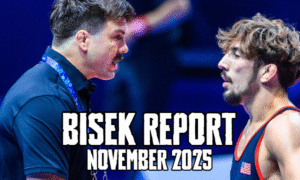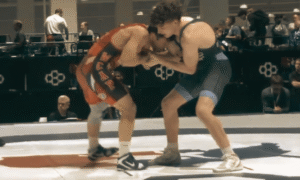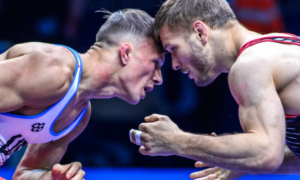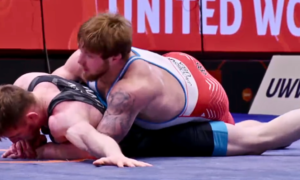If it makes sense to trace an athlete’s career in steps, then Colin Schubert (71 kg, NYAC-OTS) is your man. The 23-year-old farm boy from Wisconsin has diligently kept one foot in front of the other during his time at Northern Michigan and is beginning to assert his place among the best in the country. It hasn’t always been clear sailing, but is it ever? Schubert has had to take his lumps on the learning curve like so many others, but the difference with him is that not only is he shrewd enough to know that fact, but it’s as if he enjoys it. He wants the work. He is eager to run right up against a wall of challenges, hurling his body into the surface just enough times to see the bricks loosen up. That’s the kind of wrestler we’re talking about.
For Schubert, it is also what it takes. A pressure-hungry competitor, he came on the scene as a rugged, nose-to-the-grindstone sort who didn’t always get his hand raised, but was always down for a battle. Count this as the primary foundation in which Schubert’s career has been built on thus far. Take a tough kid, he’ll find a way to make himself tougher. But when you show him he is capable of being more than just a bruiser and allow some time for the technical finer points to kick in, eventually you’re going to have a very dangerous individual on your hands. Such is the story.
The country got a full dose of Schubert’s impending emergence at the 2017 US Greco-Roman World Team Trials in Las Vegas last month. A dark horse going in, to be sure, Schubert was turned back by eventual champ Patrick Smith (Minnesota Storm) in his first bout, but what happened after was a virtual awakening. In the consolation bracket, the NMU wrestler managed to defeat two notable fellow prospects in a row to find himself in the bronze medal/National Team match with 2016 Olympic Trials winner RaVaughn Perkins (NYAC). The ride ended there for Schubert, though the point was made — he is starting his ascent to the next level.
The United States Greco-Roman program is a whole lot healthier when the athletes deemed to be “developmental” actually begin to develop. That means Schubert is now entering a new phase of his competitive life. He is no longer just biding his time on the depth chart. Rather, he’s a very legitimate, very serious dude everyone is going to be paying close attention to. Comes with the territory. You’re free to sit back and wait to be impressed all over again, or you can go right ahead and fight your way to a front-row seat. Either way, for those interested in watching Colin Schubert continue to make waves, get comfortable. It looks like you’re going to be here for awhile.
Colin Schubert — 71 kg, NYAC-OTS
5PM: Did you have a feeling going into the Trials that this might be a big performance?
Colin Schubert: You know, I felt like I had a really good weight cut for that tournament. But yeah, it was just a feeling that the last two weeks of training, my weight was really good, I was getting down to weight easily. I felt fast, I felt quick. I talked to Austin Morrow and I was like, “Look, I know I’m probably not going to get a very high seed and that I’m probably going to get either Pat Smith or RaVaughn first, so I want to brawl these next couple of weeks because I have to be ready to be that physical with Pat Smith or RaVaughn Perkins. ”
5PM: And right off the bat you did have Smith, and that was a pretty exciting match. There were some good points scored and you were right there in that match. What is it about wrestling a guy like Pat Smith, who is at a place you’d like to be in soon? What do you look for out of yourself when you’re wrestling a guy with that kind of experience?
CS: What I like to do is be just as physical as him. I knew he was going to come out right away and try to push me out and try to control the positions. I’ve been talking about it with Coach (Andy) Bisek this whole time, I’m good at scoring, I’m good at getting my offense going, but I knew to beat a guy like Pat or RaVaughn I’d have to control the positions. I knew he was going to push the pace, too. I knew that was one his big things, that I had to equal his pace. Or he was going to have to go at my pace to stay in the match.
5PM: Despite it being a good match, Smith moved on and you got put into the consolation bracket. What is your mindset at this point?
CS: When I first got done wrestling Pat, I was pretty upset. There were a lot of penalty points, there were a lot of finger-grabbing calls being made. I was upset that match because I didn’t feel like we were allowed to just wrestle. But after that, Coach Bisek came up to me and said, “You were right in the match, just keep doing what you’re doing.” I just wanted to score points. It was really fun wrestling Pat. I didn’t want to keep the train rolling because I lost, but I wanted to keep my offense going. I wanted to keep scoring points.
5PM: You looked like you had something going against Smith, so it seems natural that you’d want to keep a similar approach. Do you pay any attention to who your next opponent is at this point?
CS: No, you take it one match at a time. As soon as you start thinking about the next match, that’s when you’re going to lose in those last couple of seconds and you’re going to be wrestling in the next consolation.
5PM: In the consolation semifinals you had Cody Pack and that was a very competitive match. You’re both young, scoring-hungry competitors. You had a four-pointer in the second period that seemed to change the momentum in your favor. Did that soup up your confidence?
Colin Schubert: First of all, I just want to say Cody Pack is a great competitor and yeah, we both put points up on the board. But I thought that the momentum changed before that. In the second period, there was a hip toss or something and I think he got called for legs. I might have been down by two or maybe it was tied at that point. But I felt like I had him on his heels. I felt like I was pushing him and staying in good position. I wasn’t panicking. I knew I was going to be able to score still and I felt the momentum change from there.
5PM: Next was the third place bout against RaVaughn. That one didn’t turn out how you hoped and I’m sure you were disappointed not to make the National Team. Even still, there had to have been a space a couple days later where you realized that you absolutely made your presence felt at the Trials.
CS: It’s kind of funny because I came off the mat after that, and I normally roof houses in the summer, so I got up thinking to myself, Well, I guess I’m spending another year roofing houses. It was disappointing. But I mean, a couple days later I thought about it and you know, when I first started here I saw RaVaughn beat Ellis Coleman, who was just coming off being a 2012 Olympian. I watched Pat Smith compete with Harry Lester, and I thought that these guys were going to be the next big names and to know that although I might not be there yet, but that I am getting close to that level where I want to be, it was a good feeling. But again, I’m still not where I want to be at all. There are still three good guys ahead of me.
5PM: Has there been a point since you’ve been at Northern where you said to yourself, “I could one day be an Olympic Team member, I could one day be a World Team member” and assuming that’s the case, when was it? Was it during a match, at an event, when?
CS: Okay, I am going to tell you a story and he’s probably going to hate me for telling this, but where I started finally feeling like I was taking a step in the right direction was up in the room at Northern. It was a practice match. Me and Chris Gonzalez had each other for a match that day. Chris is beating up on me, okay? He had been beating up on me for two years solid. But during this practice match, I was staying in good position, attempts, attempts, and I ended up beating him that day, which I felt was a really big jump for me. Chris is a really good wrestler. I felt that was when I started making more of a progression and after that I took fifth at the US Open. Chris is a good athlete and that is when I finally had my day where I got him and felt like that was when my turning point was.
5PM: How do you measure yourself against overseas opponents? People on the outside looking in, we hear the stories all of the time, it’s a different style and US guys typically use it as an important benchmark. How have your overseas experiences so far played into your own development?
CS: What I would say is a lot more crisp technique. You know, in America there are a lot of folkstyle wrestlers in Greco, so sometimes there is a technique like an arm throw you can get away with and a guy will go over. When you’re wrestling a foreigner, your technique has got to be crisp or they are going to stop it. And their pummeling, too. This year, I noticed I really have to stop that underhook and I learned that by going overseas, and I’ve gotten a lot better at that.
5PM: Next up is Akron and the University Nationals and as we know, it’s not a Trials tournament. It’s a little over a month between the Senior Trials and this event. Is this an opportunity to build on what you showed in Vegas?
Colin Schubert: A little bit yes and a little bit no. Obviously, you want to keep the ball rolling. The more momentum you have, the better you’re going to end up wrestling. But again, I’ve been in this sport for four years and I know that just because you wrestled well at one tournament doesn’t mean people are expecting you to wrestle well at the next one. You still have to show up and wrestle your butt off.
5PM: Here’s a two-part question: when you are training, be it for an event or just being at practice, what are specific items you like to work on? Also, since I’m practically forced to ask this to every one of you guys, how has Bisek played a role in your day-to-day preparation?
CS: When I am learning a new move, I’ll drill it a couple of times. But often, it’s “play wrestling” or live. Austin Morrow and Anthonie Linares, for us it’s a lot of play wrestling because if you’re drilling, you are just letting the guy have it. If you’re play wrestling with it, you are figuring it out and getting better at it even though we’re not drilling. And the other thing is live momentum, it helps with my concept of always pressuring and always trying to score points. That’s why I like wrestling guys like Austin Morrow and Anthonie Linares who are around my weight class.
As far as Bisek goes, when Aghasi (Manukyan) left, he had some big shoes to fill. I thought Andy did a great job because he so has that same concept that Aghasi had, that you are there to score points. That’s my style, I want to score points, I want to put points up on the board. But what I think Andy did is he helped me with my positioning. Andy is the type of guy who is enthusiastic about wrestling. I show up every day to practice with Andy and you want to wrestle for him, he gets you excited about wrestling that day.
5PM: How’s the rest of your summer going to shake out following the University Nationals?
CS: I am going to go home and work. I would like to attend the National Team camp in late July and we’ll see where it goes from there, if I am asked to wrestle in a couple of tournaments. I don’t know what the schedule is, but I’d like to keep training during the off-season while I am still working, too.
5PM: In the perfect world of Colin Schubert, would you like a heavy schedule of tournaments? Or do you like having a good amount of space in between events so you can make adjustments and then get back out there?
CS: Honestly, it all depends on how I’m feeling around that time. During the summer, I kind of like to be sharpening up on technique and maybe not as many matches. Because I mean, throughout the year, you can get burnt out. Every athlete gets burnt out. So maybe more of a training regiment, getting stronger, things you have to do for matches that way you can prepare yourself for the Bill Farrell Memorial or matches Coach Lindland or the coaches want you to wrestle.
5PM: If you were to combine your most recent competitions with the overall time you’ve been at Northern, how do you see the progress that you have made?
Colin Schubert: I’m heading in the right direction and I’m closing the gap on good guys. Even at the Trials, I didn’t wrestle outstanding. I thought I wrestled to where I was supposed to. What I want to do now is start beating the guys I am not expected to beat. That’s what my steps have been, beating the guys I’m not supposed to beat.
Listen to “5PM04: Two-time Greco-Roman world teamer Cheney Haight” on Spreaker.
SUBSCRIBE TO THE FIVE POINT MOVE PODCAST
iTunes | Stitcher | Spreaker | Google Play Music | RSS


















